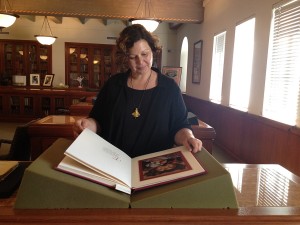Archivist engages in outreach
For USC Libraries Special Collections archivist Michaela Ullmann, every day is an adventure into the lives of World War II era German exiles.

Bookworm · USC Libraries Special Collections archivist Michaela Ullmann glances over historical poems at Doheny Memorial Library. – Deena Khattab | Daily Trojan
Ullmann, an exile studies librarian, received her master’s degree in cultural anthropology in Germany. Exile studies, however, go much deeper than basic anthropology. Ullmann’s work focuses on the group of German-speaking exiles who fled to Southern California during World War II.
In addition to collecting papers and materials, Ullmann analyzes the impact of this community of exiles on the Los Angeles cultural scene. She finds materials that show how German exiles influenced the Los Angeles art, music and literary movements of the time.
Today, her work influences Holocaust researchers and writers, as well as students at USC.
“The work that we do here affects people. Every day, people are influenced by our materials, and we have a direct connection to the scholarly work that they produce using our materials,” Ullmann said.
Beyond curating the exile studies collection, Ullmann also engages in library outreach. She invites professors and their classes to experience Special Collections for themselves, tailoring the content of the archive to fit the needs of the visiting class.
“I really love being connected with students and seeing that what we do gets somewhere. It doesn’t stay in a box. We create excitement and engagement,” Ullmann said.
The students Ullmann connects with most are those who work at Special Collections.
“I always enjoy having student workers be involved in this. It’s interesting for them but it’s also interesting for me to see how their experiences and perspectives affect their work,” Ullmann said.
Lisa Ebiner Gavit, a junior majoring in philosophy, works at Special Collections with Ullmann.
“It is really fascinating to sort through the primary sources,” Gavit said. “It is both challenging and rewarding to try to piece together the story of a family or an individual simply by looking at their photos and reading their letters and notes.”
Ullmann said her biggest obstacle is making sure all students, not just the students who work there, are aware of the research resources housed in the archives.
In order to further connect the students with the available primary materials, Ullmann began hosting what she calls “petting zoo” sessions at Special Collections. During these sessions, students can browse the materials and interact directly with primary sources. The goal of these petting zoos is to get students thinking about the documents and potential research projects they can create using the materials.
But the outreach does not end there. Ullmann and the Special Collections staff have recently launched a Primary Sources Research Award. Students can submit papers and assignments that they used primary sources to complete to win a $500 award. These papers can be previously competed for class — the only criterion is that the student used primary documents from any USC Library, including the Cinematic Arts Library or the East Asian Studies Center, to write the paper.
In order to further help students in their quest to find research materials, Ullmann is working on an online tutorial to show students how to access the archives. She hopes that if students are better acquainted with the system, they will feel more comfortable coming into the library to do research.
“Many undergraduate students don’t know that they are more than welcome to come and work with these materials,” Ullmann said. “We’re trying to get rid of their fear of the unknown.”
Follow Deena on Twitter @deenakhattab
